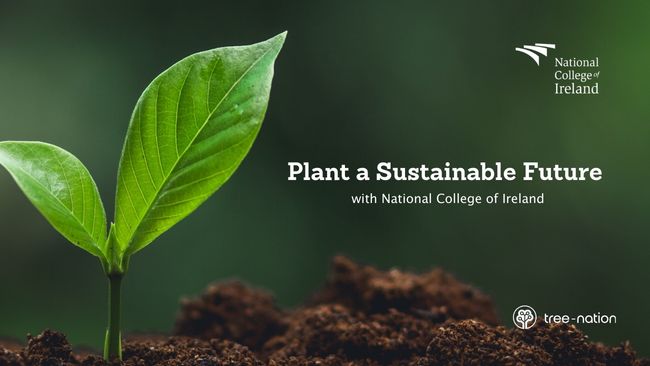 NCI has adopted a number of green initiatives, including our involvement with Tree Nation.
NCI has adopted a number of green initiatives, including our involvement with Tree Nation.
At National College of Ireland, sustainability is not just a buzzword; it's a guiding principle that permeates every aspect of our institution. From our academic programmes to our campus operations, we prioritise sustainability to ensure a thriving future for generations to come.
Sustainability in Action
NCI has put sustainability at the very heart of our 5 Year Strategic Plan. The College aims to become one of the most sustainable third level institutions in the country and will align our teaching, research and campus to ensure sustainable practice across everything we do.
NCI’s Sustainability Strategy 2024-2029 is to be launched in 2024.
NCI is already making progress in respect of climate action and the UN's Sustainable Development Goal 13 (SDG 13), reducing its emissions over recent years. The Schools of Business and Computing, the Centre for Education and Lifelong Learning (CELL) and the Early Learning Initiative (ELI) have all been addressing the UN SDGs in their own areas. This sustainability strategy seeks to build on the great work already done and is the next step on our sustainability journey.
Early Learning Initiative
While the scale and scope of the global goals is unprecedented, together through ELI, NCI is upholding our basic responsibilities to people and planet, but also setting the stage for long-term success through prevention and early intervention programmes that consider a quality education the foundation to improving people’s lives and sustainable development.
ELI SDG Priorities
| SDGs
|
Priority
|
| 1. No Poverty
|
Building resilience and empowering people living in poverty and vulnerable situation
|
| 3. Good Health & Well-Being
|
Promoting well-being and healthy lives for children and parents
|
| 4. Quality Education
|
Ensuring equal access to all levels of education, in particular children in vulnerable situations
|
| 5. Gender Equality
|
Empower and promote gender equality for all
|
| 10. Reduced Inequalities
|
Empower and promote the social, economic and political inclusion of all, irrespective of age, sex, disability, race, ethnicity, origin, religion or economic or other status
|
| 11. Sustainable Cities and Communities
|
Creating inclusive, safe, resilient and sustainable communities
|
| 16. Peace, Justice and Strong Institutions
|
Ensure public access to information and promote peaceful, responsive, inclusive, participatory and representative decision-making
|
| 17. Partnerships for the Goals
|
Engage in effective public, public-private and civil society partnerships
|
Education for Sustainable Development
Our commitment to embedding sustainability across our portfolio of programmes at NCI is a response to the demand from our students to learn more about how they can have a positive impact in the world. One of our objectives under the NCI Strategic Plan 2022-2027 is “To develop successful graduates that have a lifelong love of learning, who are valued contributors to the workforce and society, and who are committed to sustainability”.
National College of Ireland offers:
- a Microcredential in Certificate in Sustainable Business Leadership
- 7 modules with “Sustainable” or “Sustainability” in the title across 19 level 7-9 programmes
- 37 learning outcomes with ‘Sustainable’ or ‘Sustainability’ mentioned.
This commitment to embedding sustainability principles throughout its curriculum underscores NCI's contribution to advancing SDGs, particularly those related to quality education (SDG 4) and sustainable practices in business and industry (SDG 12).
Governance and Delivery Structure
At NCI, we believe that sustainability must be something that runs through all our operations. It plays a key role in our teaching, research, and business decisions. Sustainability unites us as a college. It requires a unified approach that involves management, faculty, support services, facilities, external stakeholders, and most importantly full-time and part-time students. A Sustainability Steering Group (SSG) has been tasked with developing our key actions and overseeing the strategic direction of sustainability at NCI.